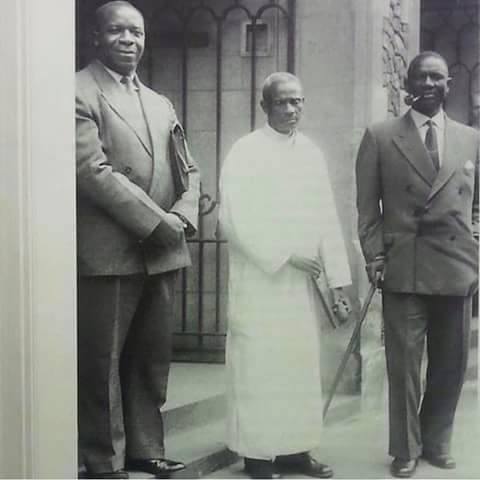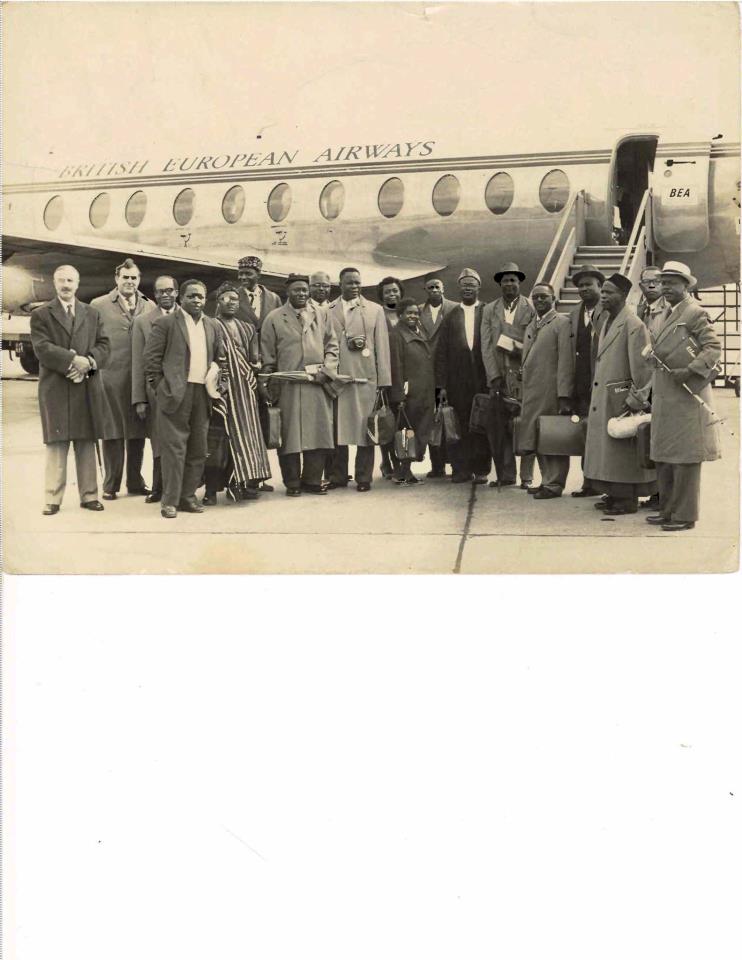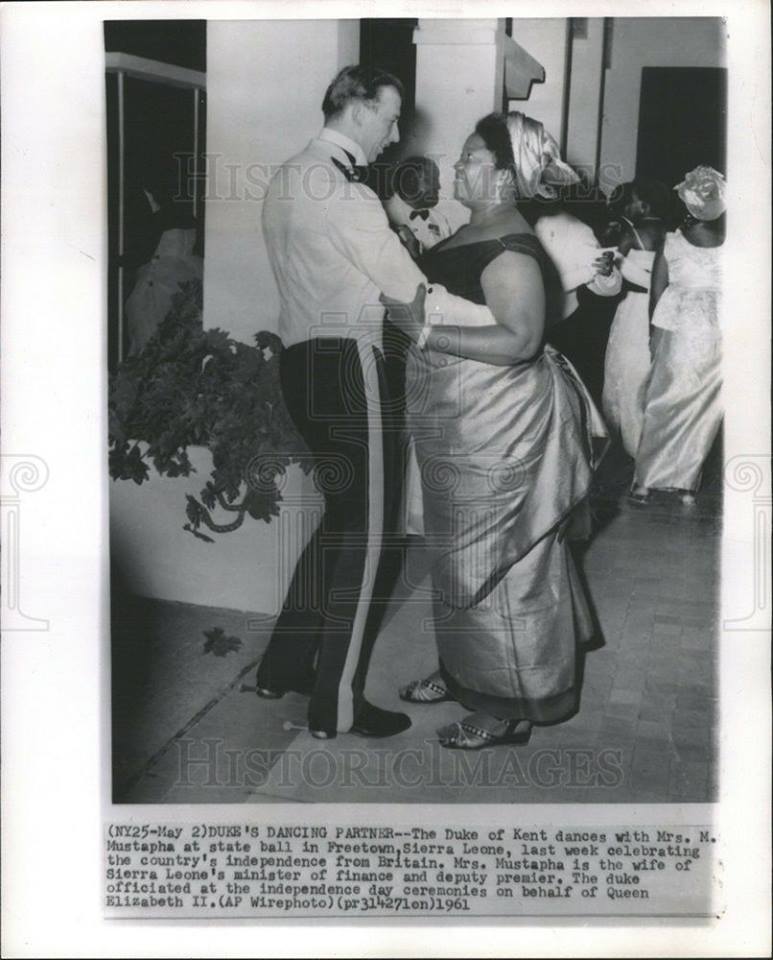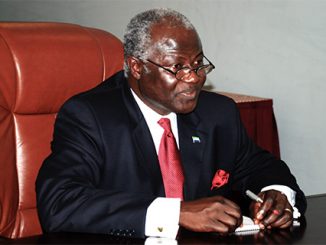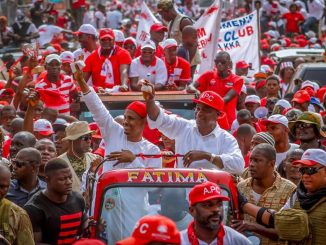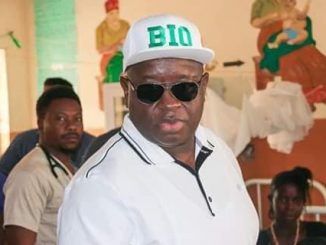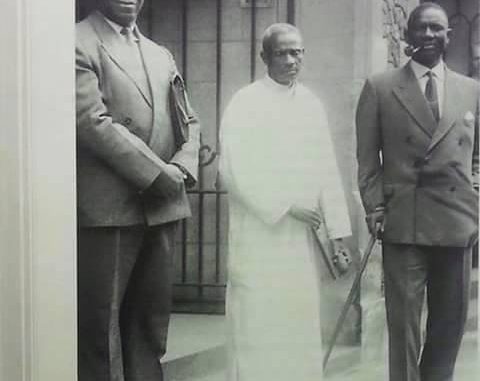
The Duke of Kent yesterday opened the new Parliament Building of Sierra Leone which became independent at midnight last night after 150 years of colonial rule. The Duke arrived through the ranks of cheerleaders shouting “Independence” and “Margai”.
The principal ceremony today will be the state opening of Parliament when the Duke hands over the constitutional instruments which make Sierra Leone an independent nation. Later Sir Maurice Dorman, the present Governor, will be sworn in as Governor-General.
A state of transition
The foundations of Freetown, capital of Sierra Leone, go back to the eighteenth century when the first shiploads of freed slaves were brought back to Africa. They founded the town at the foot of rolling hills and some of their wooden double-storied houses still stand. To the Creoles – the returned slaves who settled in Freetown – England became the model on which to base their lives. The surrounds of Freetown abound with names like those of New England: Leicester, Hastings, or Lumley. The generously proportioned women of Freetown rarely wear African dress. Rather less than fashionable cotton frocks and felt hats are the general order of the day.
Government House, where the Duke of Kent is staying, is one of the few modern buildings in Freetown. A new road, scarcely completed, unusually wide and heavily beflagged, leads steeply uphill to a new Parliament built in six months by an Israel construction company. The chamber is round (is this a portent of party politics to come?).
Government guests have been arriving here since the weekend. In addition to Liberia and Nigeria, nearly all the other independent African States are sending delegations, though there are relatively few prominent names among them – this is the fourth African independence celebration within six months and attendance at these events is turning into a time-consuming affair.
The Sierra Leone Independence celebration programme is a lengthy affair which opened last week with a Queen’s Birthday parade followed later in the day by a “Miss Independence” beauty contest which was attended by nearly all members of the Cabinet. An all-woman jury was shown to prefer intelligence to beauty. The winning girl’s remark that she opposed polygamy because she was a jealous person clearly obtained high marks.
There are receptions galore by the Governor, by the Prime Minister, the House of Representatives, a state banquet and state ball. Tonight there will be a searchlight tattoo.
Sierra Leone has become the latest West African state to win independence, after more than 150 years of British colonial rule.
The new nation was born at the stroke of midnight, when its green, white and blue flag was unfurled. A huge crowd, gathered at Brookfields Playground in Freetown to watch the historic moment, broke into tumultuous cheering.
Independence Day formally began as the Duke of Kent handed over royal instruments recognising Sierra Leone as an independent nation.
Sir Maurice Dorman, Governor since 1956, was then sworn in as Governor-General by Chief Justice Beoku Betts.
Messages of welcome to the new government, led by Prime Minister Sir Milton Margai, came from the Prime Minister, Harold Macmillan, and from the Queen.
Her Majesty is due to visit Sierra Leone during her tour of West Africa later in the year.
State of emergency
Independence festivities have been taking place all week, mainly centred on the harbour area of Freetown. Three days of public holiday have been declared, and the city is in party mood, with streets decorated with bunting and the new national colours everywhere.
But the build-up has been overshadowed by the state of emergency, declared ten days ago following a campaign of sabotage by the opposition All People’s Congress Party (APC).
The party has been urging that independence should be postponed until free elections have been held.
The leader of the APC, Siaka Stevens, was arrested just over a week ago, along with his right-hand man, Wallace Johnston, and 16 other party members. They had been planning a general strike to coincide with the independence celebrations, and it was feared riots would break out if the strike went ahead.
The government in Freetown is insisting that elections will be held next year, as agreed under the terms of independence. Ministers say the arrests were made to protect those visiting the country for the ceremonies, and, they say, there is every intention to release those detained as soon as the ceremonies are over.
FROM LEFT : SIR ALBERT, SIR MILTON AND SHAKI
Arriving in London for the Sierra Leone Constitutional Conference in 1960 :
SIERRA LEONE INDEPENDENCE BILL SECOND READING IN THE LORDS : THE MINISTER OF STATE FOR COLONIAL AFFAIRS (THE EARL OF PERTH)
“We are most anxious of course to do all that we can to help Sierra Leone in her future development. Shortly after the Constitutional Conference we announced our intention of giving aid, at the moment of Sierra Leone’s independence, to the tune of £7. million; about half under Commonwealth Assistance Loans and the other half as a gift to take care of Colonial Development and Welfare schemes not yet completed. And we are only too ready to give what help we can in the way of technical assistance…
We have had the Commonwealth Development Finance Corporation working on the Guma Valley hydro-electric scheme, which is very important for the country’s development. But we want to help Sierra Leone not only on the economic side but also in the development of her educational facilities. Your Lordships will know of the Fourah Bay College, the establishment of which was so generously helped by Durham University. We want to do all we can to help on the educational side, in so far as Sierra Leone may wish it. So much for the background, my Lords…”
THE EARL OF SWINTON
“My Lords, as an old Colonial Secretary and as a Resident Minister who spent many days in Sierra Leone during the last war, I should like—and I know my noble friend, Lord Balfour of Inchrye, who succeeded me, would wish to be associated with this—to extend our best congratulations and the warmest welcome to Sierra Leone.
I am happy to think that Sierra Leone has other assets. Certainly it has its agriculture, but there are considerable assets besides. There are the diamonds, which are of enormous value. I recall that when I was Colonial Secretary I made the agreement with the Selection Trust for the exploitation of the diamond mines, I must say with great credit to the company, on extremely favourable terms. They did all the exploration and the Sierra Leone Government got 27½ per cent. of the profits. I think that was a pretty good deal. I remember that when Lord Balfour of Inchrye and I were in Africa the Government’s diamond share then, in the war, was bringing in something between £350,000 and £400,000 a year. Then I remember—I do not suppose it is exhausted 37 —the considerable iron ore supply, with a railway to get it. I imagine that iron ore is still coming from it. There was quite valuable timber as well…”
LORD DENNING
” My Lords, it was my privilege last year to go to Sierra Leone to open the new Court of Appeal, and, as the noble Lord, Lord Ogmore, has said, I attended the sitting of the Court wearing a Peer’s robes together with a full-bottomed wig. Indeed, it was a great occasion to see that the people of Sierra Leone are perhaps in advance of the other countries, because the people there have trained up their own lawyers, and from those lawyers have produced their own judges; so that in Sierra Leone you now have judges and magistrates of the country very much attached to the Common Law which they have inherited from this country, and at one in upholding the fundamental human rights which are now to be in their Constitution. Their attachment to the appeal to the Judicial Committee of the Privy Council, which is to be ensured, and the independence of the judges, which also is to be ensured by the fact that a judge cannot be removed except after inquiry there and eventually on an appeal to the Privy Council, means that they are carrying through the principles which they have inherited from this country. With that strong bulwark, I am confident that they will play their full part among the emergent countries, and I would add my word of welcome to this Bill.”
(C) Hansard 27 March 1961 vol 230 cc23-40 2


Dawah Sesekoker Which set the Stage for this Sir John Moses Kamara


Dawah Sesekoker Lined up Leadership to this





